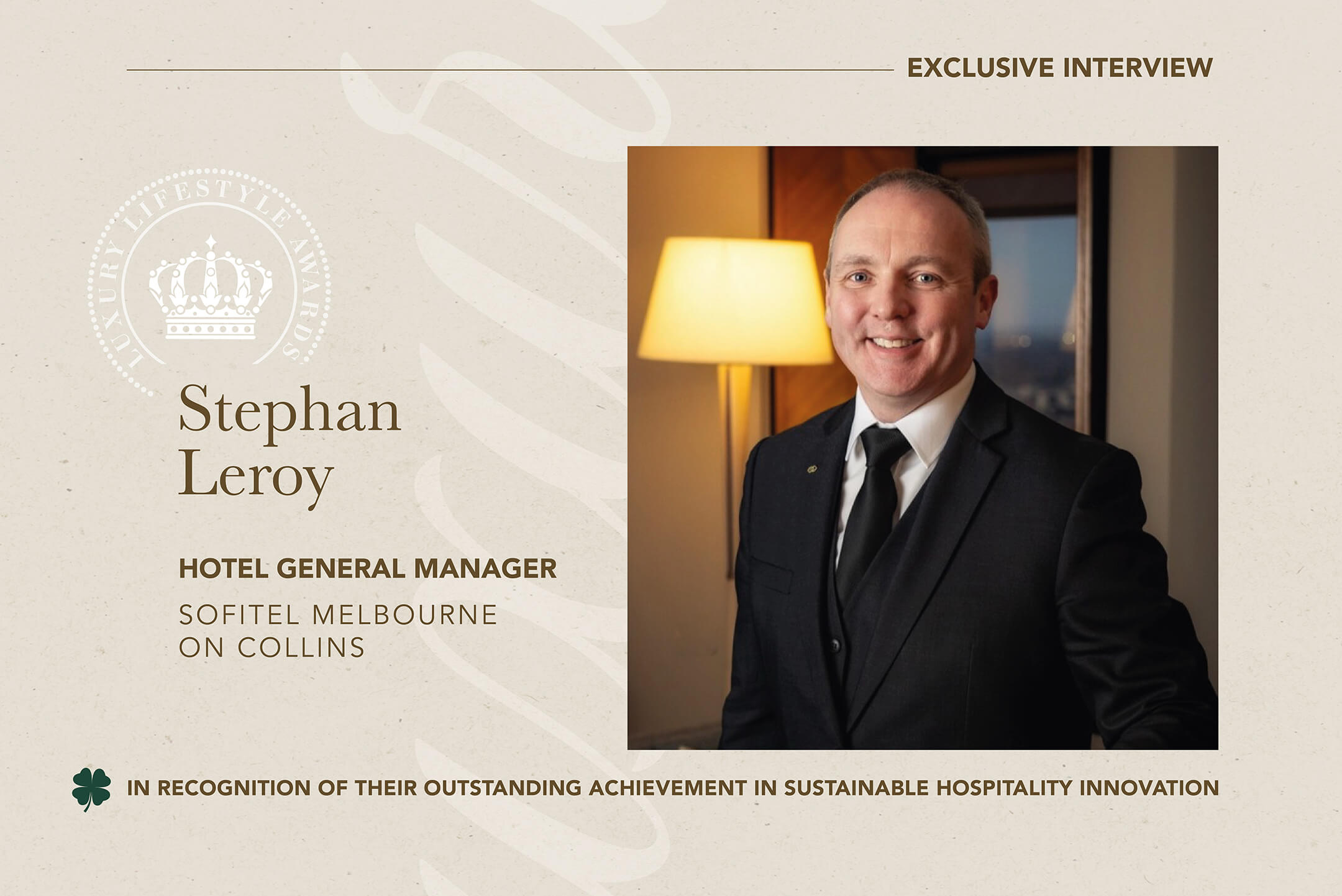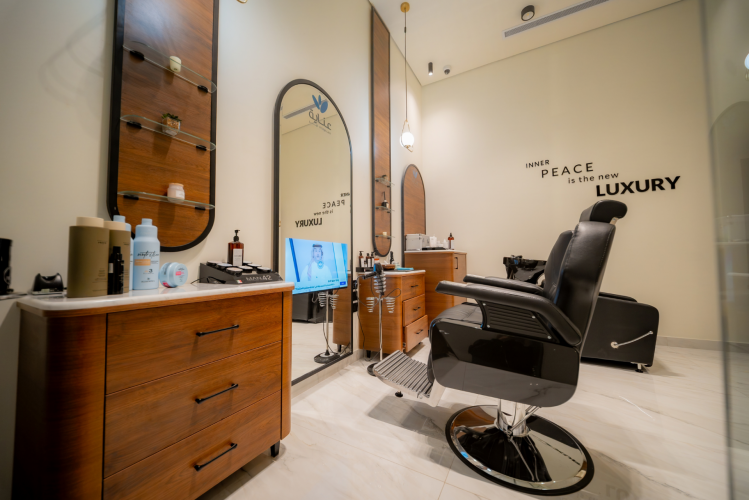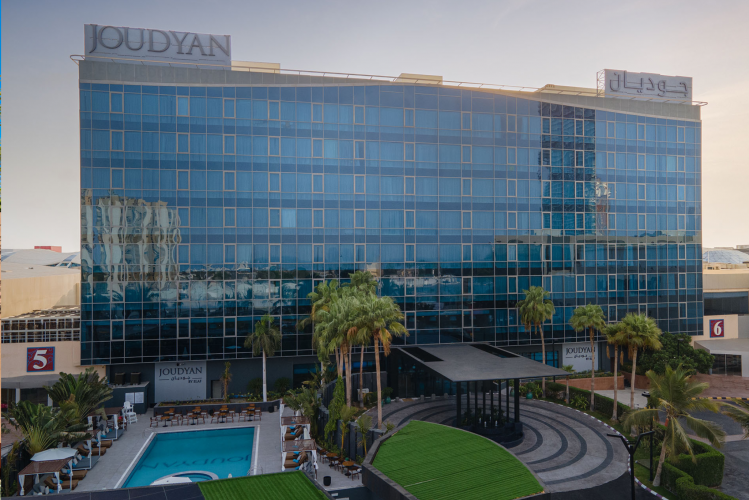Standing tall at the top end of Collins Street in Melbourne’s cultural and business district, Sofitel Melbourne On Collins represents a new chapter in environmentally responsible hospitality. Recognized by the 2025 International Sustainability Awards for its achievements in innovative eco-focused hotel operations, the property shows that high-end guest experiences and environmental awareness can successfully go hand in hand.
At the forefront of this progress is Stephan Leroy, Hotel General Manager, who has been instrumental in guiding the hotel’s major environmental improvements. Under his leadership, the hotel has reached important sustainability milestones, such as earning Green Globe certification, launching its in-room Circular Water Bottling Initiative, and forming strong partnerships with local organizations to minimize waste and encourage reuse. From reshaping procurement systems to introducing advanced waste-monitoring tools, Stephan’s approach signals a strong direction for the future of hospitality, one where comfort and conscious practices move forward together.
Alexander Chetchikov, President of the World Luxury Chamber of Commerce and founder of the Luxury Lifestyle Awards, leads this interesting discussion, highlighting the strategic planning and operational discipline behind one of Australia’s most forward-thinking hotels.

Alexander Chetchikov: Congratulations to Sofitel Melbourne On Collins on receiving the 2025 International Sustainability Award. This recognition highlights the outstanding work the hotel has done in advancing sustainability within the hospitality industry. With such a significant achievement, how do you see this award aligning with your broader vision for the hotel?
Stephan Leroy: It’s an honor to receive the 2025 International Sustainability Award. At Sofitel Melbourne On Collins, sustainability is not a standalone initiative but a continuous journey that underpins our broader vision of delivering luxury with purpose. This recognition reinforces our commitment to thoughtful hospitality – where environmental responsibility, guest experience, and community impact go hand in hand. It also encourages us to keep learning, collaborating, and setting a higher standard for what it means to be a sustainable luxury hotel, not just in our city, but also on a Global level.
AC: One of the standout initiatives that helped the hotel secure this recognition is the Circular Water Bottling Program. This initiative alone has resulted in a substantial reduction in single-use glass. Can you share the inspiration and development process behind the initiative?
SL: It wasn’t a straightforward journey. Back in 2019, we removed single-use plastic water bottles from the hotel and encouraged guests to drink Melbourne’s award-winning tap water. While the intention was environmentally sound, many guests saw it as cost-cutting, and it quickly became our most frequent complaint. We realized that true sustainability means balancing environmental goals without diminishing the guest experience. So, after nearly two years of working closely with our teams and suppliers, we introduced the Circular Water Bottling Program – an initiative that aligns with our sustainability ethos while meeting the expectations of a guest in a luxury hotel.
AC: What operational efficiencies and guest experience benefits have you observed since transitioning from single-use glass bottles to reusable glass and MODA-filtered water systems?
SL: The shift to reusable glass bottles and MODA-filtered water has helped us strike a better balance between sustainability and guest experience. Now that we’ve met our guests’ basic expectations for quality and convenience, we can focus on exceeding them by creating more meaningful and lasting impressions. Operationally, the impact has been significant: by reusing bottles, we’ve prevented nearly 40,000 single-use glass bottles from entering our operation and needing to be recycled off-site in 1 year. It’s a simple change that’s made a real difference, both behind the scenes and for our guests.

AC: Your team recently achieved Green Globe certification — a significant milestone. What were some of the most rigorous or transformative changes implemented to meet the standards required for this recognition?
SL: Achieving Green Globe certification was a proud and transformative milestone for our team. We held an ISO 14001:2015 certification since 2015, which focused on monitoring and auditing our Environmental Management System, whereas when we began reviewing Green Globe, it required us to take a broader, more integrated approach. It pushed us beyond environmental compliance and into areas like health and safety, quality, and sociocultural responsibility. One of the biggest shifts was moving from general environmental goals to specific, measurable benchmarks. Green Globe requires tracking over 380 compliance indicators across energy, water, waste, community engagement, and staff wellbeing. We now measure things like kilowatt-hours per guest night, food waste per guest, and look at our local or Fairtrade suppliers that we engage with. These detailed metrics challenged us to look deeper into our operations and think more strategically about long-term improvement. It was a rigorous process, but it brought real clarity and cohesion across departments. More importantly, it’s shifted how our teams think – sustainability is no longer just about doing less harm, it’s about doing more good, together.
AC: How do you ensure that sustainability is not only a strategic priority but also embedded in your team’s daily language, culture, and day-to-day operations?
SL: We’ve found that sustainability becomes part of the culture when it’s owned by the whole team, not just one person. I’m particularly proud of our HSE (Health, Safety & Environment) Committee, which brings together a mix of frontline team members and senior leaders from across the hotel. They meet monthly to discuss sustainability initiatives, share ideas, and track progress. This committee has been instrumental in driving change on the ground. They not only champion key projects but also act as communicators, keeping their teams informed, involved, and inspired. It’s this peer-to-peer engagement that’s really helped embed sustainability into our day-to-day operations and language. We’re still learning, but having a cross-functional team leading the charge has made all the difference.
AC: Sofitel Melbourne On Collins works closely with suppliers and local partners to close the loop on resources. Could you share some examples of how these collaborations are creating meaningful impact across your operations or the wider community?
SL: One of the earlier closed-loop initiatives introduced by our HSE Committee was a milk keg system called The Udder Way, in partnership with local microdairy St David’s Dairy in Fitzroy. They supply us with 18L reusable milk kegs which has eliminated the need for single-use 2L plastic milk bottles in our breakfast service. At the time, we saw it as a strong sustainability initiative, reducing plastic waste and supporting a local supplier. What we didn’t anticipate was the exceptional product quality and the positive impact it would have on our breakfast offering overall. Today, we also source butter, cream, and yoghurt from St David’s Dairy. This not only strengthens our support for local producers and reduces delivery-related emissions but also ensures we’re serving a premium product that our guests genuinely enjoy.

AC: Could you walk us through what technologies or innovations you are currently investing in to advance your waste management and food sustainability goals?
SL: We’re still early in our journey, but we’ve been investing in a few key technologies to help us better understand and manage our waste and sustainability goals. One recent addition is a system called BinTracker, which has replaced our paper-based records with a digital scale and real-time data across all our waste streams. It’s given us a much clearer picture of what we’re generating and where we can improve. In our kitchens, we’ve introduced the Winnow system to help tackle food waste at its source. We started last year with one unit in our Conference and Events Kitchen to track production waste. This allowed us to adjust menu design and reduce unnecessary trimmings and overproduction. This year, we’re adding a second system focused on monitoring buffet and plate waste from events, which means we now have visibility from preparation all the way through to what’s left on the plate. These tools have been eye-opening, not just for data collection, but for the conversations they’ve sparked among our team. It’s helped us move from assumptions to action.
AC: As an established property within a multi-use complex, what challenges have you encountered when implementing green initiatives, and how have you addressed or overcome them?
SL: Operating within a multi-use complex does present unique challenges when it comes to implementing green initiatives, particularly around space, infrastructure, and shared services. In 2023, we trialled an on-site organic food digester that converted food waste into nutrient-rich soil suitable for agriculture and aquaculture. While the system itself was fantastic, it unfortunately wasn’t large enough to meet the needs of our operation within the shared environment, and the trial was ultimately not successful. What we’ve learned is that while our sustainability goals may be global, our actions need to be deeply local. The more we collaborate with others in the complex, the greater our chance of meaningful and lasting success. We’re now working closely with our facility management partners to explore energy efficiency opportunities that can benefit the entire site. It’s a continual process of learning, adapting, and working together towards shared impact.
AC: Community engagement is a key part of your ethos: How does the hotel support local culture, arts, and First Nations initiatives while staying aligned with sustainability goals?
SL: Community engagement has always been a part of who we are, and we’re proud that Sofitel Melbourne On Collins is often referred to as the “Hotel for the Arts.” Over the years, we’ve built long-standing partnerships with local artists and cultural events, ranging from major productions to smaller, community-led initiatives. Through collaborative sponsorships, we aim to support the creative fabric of Melbourne in a way that feels authentic and lasting. Our recent transition from ISO14001:2015 to Green Globe also played a key role in deepening this commitment. One of the aspects that really stood out to us was Green Globe’s strong governance around local community engagement, particularly in relation to First Nations inclusion. It encouraged us to broaden our standards and make more intentional space for sharing local stories, supporting Indigenous artists, and creating opportunities that reflect the cultural richness of the community we’re part of. It’s an ongoing journey, and we’re grateful to be learning and growing alongside those we support.

AC: Looking ahead, how do you envision the role of Sofitel Melbourne On Collins in shaping the future of sustainable luxury within the Accor brand and Australia’s hospitality industry?
SL: In luxury, we often say we must lead by example, and at Sofitel Melbourne On Collins, we see that as both a privilege and a responsibility. We’re fortunate to be part of a forward-thinking organization like Accor, which has shown real transparency and ambition in its sustainability goals. That support gives us the confidence to keep pushing boundaries. Looking ahead, we hope our role is one of sharing; whether it’s best practices that have worked well or lessons from the things that haven’t. By being open and collaborative, we believe we can help shape a more thoughtful definition of sustainable luxury, not just within the Accor network, but across the broader hospitality industry in Australia. It’s not about having all the answers but being willing to keep learning and leading with purpose.
Thank you, Mr. Leroy, for sharing your inspiring insights and for the incredible work Sofitel Melbourne On Collins is doing to lead the way in sustainable hospitality. Your innovative environmental practices are truly setting a new standard for the industry.

To learn more about Sofitel Melbourne On Collins’ sustainability journey and initiatives, visit: https://www.sofitel-melbourne.com.au/.











